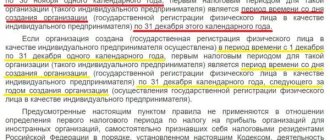Who can act as a legal or authorized representative of an organization before the tax authorities? What are the features of delegation of authority by an authorized representative? What types of intermediaries exist when submitting reports under the TCS?
The taxpayer has the right to send a tax return to the inspectorate through his representative. This is stated in paragraph 4 of Article 80 of the Tax Code of the Russian Federation. The representative of the interests of the organization in the Federal Tax Service can be legal or authorized. A mandatory condition for submitting reports with the help of an intermediary is documentary evidence of his powers in accordance with the Tax Code of the Russian Federation and other federal laws (Article 26 of the Tax Code of the Russian Federation).
The concept of an authorized representative of a taxpayer
The tax payment procedure is quite lengthy and consists of several stages. First of all, you need to collect reports, fill out a declaration and visit the tax office.
Managers of large companies cannot always afford to spend time visiting tax authorities. Today, an authorized representative of the taxpayer can pay fees for any legal entity.
An authorized representative of a taxpayer is a person (individual or legal entity) who can represent the interests of the taxpayer in transactions with tax authorities, as well as with other participants in relations regarding taxes and fees.
The authorized person carries out his actions on the basis of a power of attorney, which is issued in accordance with the procedure established by the Civil Code of the Russian Federation.
Reporting is submitted according to TKS
When submitting reports electronically under the TCS, you must be guided by the Methodological Recommendations, which were approved by Order of the Federal Tax Service of Russia dated November 2, 2009 No. MM-7-6 / [email protected] According to them, a power of attorney (a copy thereof) certifying the right to confirm the accuracy and completeness The information specified in the declaration is sent by the taxpayer's representative to the inspectorate before submitting tax reports in electronic form. A copy of it is retained by the Federal Tax Service for three years after the expiration of the said document.
The software on the representative side sequentially performs the following actions:
- tax return in electronic form in accordance with the approved format and procedure for filling it out;
- an information message about the details of the power of attorney issued to this representative;
- a transport message containing a declaration encrypted for the tax authority and an information message about the details of the power of attorney.
The representative signs the generated reports, information and transport messages with his electronic digital signature.
The representative saves the declaration and information message about the details of the power of attorney signed with his electronic digital signature.
Notice of issued power of attorney
Form
information message about the power of attorney issued to the representative granting him the authority to perform duties in the tax authorities is established in Appendix No. 1 to the above Methodological Recommendations.
The message shall indicate the period for which the power of attorney was issued, its number, information about the person represented, the principal, the authorized representative, and the powers of the representative. Let us note that the document in question provides for 16 types of powers of a representative:
- sign a tax return and other reporting;
- submit a tax return and other reporting;
- receive documents from the Federal Tax Service of Russia;
- make changes to tax reporting documents;
- sign documents on registration and deregistration;
- submit documents on registration and deregistration;
- receive from the inspection of the Federal Tax Service of Russia documents for registration and deregistration, except for the certificate;
- sign documents for accounting of bank accounts;
- submit documents on accounting of bank accounts;
- submit documents on the application of special tax regimes and consolidation of accounting for separate divisions;
- receive documents from the Federal Tax Service of Russia inspectorate on the application of special tax regimes and consolidation of accounting for separate divisions;
- sign documents on consolidation of accounting for separate divisions;
- submit applications and requests for reconciliation of settlements with the budget, obtaining information on the status of settlements with the budget;
- receive reconciliation reports and certificates about the status of settlements with the budget from the Federal Tax Service of Russia inspection;
- sign an act of reconciliation of settlements with the budget;
- sign the tax audit report and decision.
Format
submission of information in an information message about a power of attorney issued to a representative granting him the authority to perform duties in the tax authorities in electronic form (version 5.03), part LXXXVI, established by Appendix No. 1 to the order of the Federal Tax Service of Russia dated November 9, 2010 No. ММВ-7-6 / [email protected]
Other requirements
Also, when generating an information message about a power of attorney issued to a representative, it is necessary to be guided by the Methodological Recommendations, which are approved by the Deputy Head of the Federal Tax Service of Russia A.S. Petrushin on November 21, 2011. They were brought to the attention of lower tax authorities by letter of the Federal Tax Service of Russia dated January 24, 2011 No. 6-8-04/ [email protected] According to these Methodological recommendations, the authorized representative sends an information message about the power of attorney to the Federal Tax Service only electronically form via TKS simultaneously with the electronic document. He must submit to the inspection a copy of the power of attorney on paper before he begins to carry out the actions entrusted to him.
This information message must indicate the details of the power of attorney and the powers of the person, the owner of the signature key certificate, who signs and submits the electronic document. In this case, the details of the signatory in the tax return (last name, first name, patronymic) must match the details (last name, first name, patronymic) of the owner of the signature key certificate.
Filling out the fields of the information message about the power of attorney in electronic form is essentially a reflection of the information located on paper - the original power of attorney issued by the taxpayer to the authorized representative.
Here are the recommended power of attorney details for correctly filling out the fields of the information message:
- power of attorney number;
- date of issue of the power of attorney;
- validity period of the power of attorney (no more than three years);
- reflection of the right to delegate powers, if any;
- details of the taxpayer organization on whose behalf (a direct power of attorney is issued) or for which (in case of delegation of powers) the authorized representative represents the interests;
- details of the principal (the person who issued and signed the power of attorney, if he is not the head of an organization or an individual entrepreneur, that is, in the case of sub-authorization);
- details of the authorized representative(s) (person) who is given the right to interact and sign reports;
- information about credentials.
The list of credentials is required to be completed. To submit declarations electronically under the TKS, an authorized representative must, at a minimum, indicate the code - “01” (sign the tax return). When granting full powers to an authorized representative, code “99” is indicated.
Important point
The current list of powers is posted in the form of a directory on the website of the Federal State Unitary Enterprise GNIVTs Federal Tax Service of Russia: www.gnivc.ru - Information support - Classifiers and reference books - "SPPR". Directory of powers, taxpayer representative.
Types of authorized representatives
Authorized representatives who sign a tax return, confirming the accuracy and completeness of the information specified in it, are divided into two types.
The first type occurs in the following situation. The tax return is submitted by the taxpayer himself, and the declaration is signed by an employee of the taxpayer organization who is not a manager. In this case, in the name of the files of the tax return and the information message on the power of attorney, the taxpayer’s INN and KPP are entered; in the tax return, in the block “I confirm the accuracy and completeness of the information specified in this declaration,” the code “02” (authorized representative) and the surname, first name are entered , patronymic name of an employee of the taxpayer organization;
The second type - the tax return is submitted by an authorized representative, who is an organization or an individual entrepreneur. Then, in the name of the files of the tax return and the information message about the power of attorney, the TIN and KPP of the representative are entered, in the tax return in the block “I confirm the accuracy and completeness of the information specified in this declaration” the following are entered: code “02” (authorized representative), last name, first name, patronymic of an employee of the authorized organization (last name, first name, patronymic of the authorized individual entrepreneur) and full name of the authorized representative.
Power of attorney information messages are generated in various situations, including when:
- the head of the organization has signed a power of attorney in which he authorizes his employees to perform actions on behalf of the organization when submitting tax reports to the tax authorities;
- the head of the organization signed a power of attorney for an authorized representative, which is a third-party company, represented by the director and employees of the latter;
- the head of the organization signed a power of attorney for an authorized representative represented by an individual entrepreneur;
- the legal representative of the organization signed a power of attorney for its employee (employees);
- the head of the organization signed a power of attorney for the authorized representative, which is the company, represented by the head of the latter. In turn, if he has the appropriate rights, this manager signed powers of attorney for his employees;
- the head of the organization signed a power of attorney in which he authorizes the director of its branch to perform actions on behalf of the organization only in relation to the branch in the Federal Tax Service of Russia at the location of such division.
Who cannot be an authorized representative of a taxpayer
The legislation prohibits the following categories from being authorized representatives:
- employees of tax and customs authorities;
- specialists of internal affairs law enforcement agencies;
- judges, investigators and prosecutors;
- specialists of state extra-budgetary funds.
This rule is enshrined in Article 29 of the Tax Code of the Russian Federation. This legislative norm was established for the reason that these persons represent the interests of the state and cannot simultaneously be representatives of the taxpayer and the party exercising control over the payment of taxes and fees.
Responsibility of the taxpayer's authorized representative
Authorized representatives of the taxpayer are responsible to the participants in tax legal relations. They are responsible for representing interests in the following cases:
- related to company registration with tax authorities;
- related to filing a declaration;
- related to the collection of tax arrears from taxpayers;
- related to holding a company accountable for violations in the field of payment of taxes and fees, as well as in other cases if the action or inaction of the tax authorities affects the rights of the organization.
The authorized person is responsible for meeting deadlines, filing tax reports, correctly filling out the tax return, as well as for the correct calculation of the final amounts.
For this reason, the taxpayer's authorized representative must have a very good understanding of modern tax laws.
Legislative norms
Tax legislation provides for such a concept as representation in matters of tax legal relations. And this means that the payer can act in tax matters, representing his interests, not only personally, but also through a legal representative who has every reason to act on behalf of the payer.
In other words, the payer can entrust his rights and obligations within the framework of tax relations to a representative.
All payers of taxes or fees, as well as tax agents, who represent a separate group of payers, according to Article 26 of the Tax Code, have the right to a representative if his powers have been documented. That is, the payer has the right to issue a power of attorney from a notary for his representative, after which the latter can act to represent the interests of the payer.
At the same time, the payer - an individual and the payer - organization, the powers of the legal representative are confirmed in different ways. Thus, according to Article 27 of the Tax Code, an organization, by signing an internal order and entering it into the constituent documents, indicates a specific employee as its representative.
Most often, his role is played by the director, chief or his deputy. It is these individuals who represent the interests of the entire organization in matters of taxation and payment of fees.
The payer - an individual can indicate and confirm the powers of his representative according to civil law. That is, by notarizing the authority on the basis of which the representative can act on behalf of the payer.
If the payer himself is incapacitated or limited in his actions, then his representative is most often his guardian or trustee. That is, someone who, within the framework of civil law, can represent the interests of an individual. Including in matters of taxation.
All financial aspects of participation in tax legal relations are carried out exclusively at the expense of the payer, and not his legal or authorized representative. The representative is only an intermediary in the transfer of payment documents and funds between the payer and the tax authority, nothing more.
Moreover, according to Article 28 of the Tax Code, all actions that are carried out by a representative of an organization on its behalf, or inactions, are the actions of the organization itself. That is, if a representative does not pay all taxes and fees on time (an example of inaction), then this action is equivalent to the action of the organization.
Within the framework of tax law, it turns out that it was the organization that failed to pay taxes and fees on time, and not the individual who represents it.
Tax agents, like any other payers (should be understood as individual individuals and legal entities) may have a representative, legal or authorized. Special rules do not apply to tax agents; all actions and powers of representatives remain in full force and effect of tax and civil legislation.
Power of attorney for an authorized representative of the taxpayer
An authorized representative of a taxpayer carries out his activities on the basis of a power of attorney. A power of attorney is a written agreement between a taxpayer and a third party regarding the transfer and division of rights. According to Article 185.1 of the Civil Code of the Russian Federation, the validity period of a power of attorney is no more than 3 years.
If the agreement does not contain information about the terms, then the power of attorney is considered to be valid for exactly one year. Moreover, if the date of opening of the power of attorney is not indicated, then it is considered invalid.
The authorized representative has the right to perform all actions specified in the power of attorney personally.
He can delegate his powers to third parties, but only if this is really necessary.
In this case, the authorized person is obliged to notify his principal and issue a power of attorney to a third party. Such a power of attorney must be notarized.
Who is the legal representative under the Administrative Code - the management company or its director?
The possibility of transferring management of an organization to another legal entity or individual entrepreneur (IP) is provided:
- clause 1 art. 42 of the Law “On Limited Liability Companies” dated 02/08/1998 No. 14-FZ;
- clause 1 art. 69 of the Law “On Joint Stock Companies” dated December 26, 1995 No. 208-FZ.
Important! When establishing a legal entity, information about the management company is entered into Sheet E f. P11001. Clause 14.2.05.36 of the letter of the Federal Tax Service of the Russian Federation “On the direction of legal positions...” dated January 31, 2014 No. SA-4-14/1645 states that information about an individual directly performing management functions is not entered into the Unified State Register of Legal Entities.
Since information about the head of the management organization is in the Unified State Register of Legal Entities, in practice he represents the interests of the managed entity without a power of attorney. Since the legal representative is an individual, the director of the management company is the legal representative of two organizations: the manager and the managed (see also the decision of the Moscow City Court dated April 10, 2018 in case No. 7-4128/2018).
The procedure for issuing a power of attorney for an authorized representative of a taxpayer
A power of attorney has a certain procedure for issuance, which is established by Article 185.1 of the Civil Code of the Russian Federation. At the same time, on the basis of this document, the authorized person has the right to perform all legal actions to the same extent as the principal.
According to the law, the contract must have a unified form. The powers of the trustee are confirmed by a notary.
The power of attorney must be issued with the signature of the head or the person replacing him. The organization's seal is not required. This rule is enshrined in paragraph 4 of Article 185.1 of the Civil Code of the Russian Federation. Also, if the commissioner files tax returns, he may provide written notarization.
Types and features of powers of attorney from legal entities
The general rules for drawing up powers of attorney are regulated by the Civil Code. Thus, according to the general rules, a power of attorney must be drawn up in writing. A power of attorney must meet two basic requirements:
- be certified by the signature of the head of the enterprise (legal representative) and a seal (despite the abolition of seals at the legislative level, in practice documents without them are not accepted and are not used in business);
- contain the date of issue, otherwise the power of attorney may be invalidated.
Grounds for termination of the power of attorney
Article 187 of the Civil Code of the Russian Federation contains grounds for termination of a power of attorney:
- if the power of attorney has expired;
- if the power of attorney is canceled by the principal;
- if the trustee himself renounced his authority;
- if the legal entity has ceased its activities as a result of liquidation or reorganization;
- if the principal and the trustee are declared incompetent or missing;
- upon the death of the principal or trustee;
- if a bankruptcy procedure has been introduced in relation to the organization, in which the principal loses the right to issue powers of attorney.
There are no deadlines for revocation of a power of attorney for either the principal or the authorized person. If the principal changes or cancels the power of attorney, he is obliged to notify the authorized person and the tax authorities about this.
The taxpayer's legal successors retain their rights and obligations that arose as a result of their actions after it became known about the termination of the power of attorney. However, the rule is not valid if the tax authorities were aware of the termination of the document.
After the power of attorney has expired, the authorized person or legal successor is obliged to return the document to the taxpayer immediately.
This obligation is two-sided.
If this does not happen, and the organization is unable to return the document form, then it must submit an announcement within the established time frame that the power of attorney is considered invalid. This is necessary to prevent fraudulent activities, namely to ensure that no one else can use the company’s power of attorney.
After publication of the announcement, all actions under the power of attorney carried out within the period following publication are considered invalid.
Powers of attorney equivalent to notarized ones
A power of attorney for the authorized person must be notarized, but there are certain circumstances when notarization is not possible. Article 185.1 of the Civil Code of the Russian Federation establishes a list of powers of attorney that are equivalent to notarized ones:
- documents issued to military personnel undergoing treatment in hospitals. Must be certified by the head of the medical institution or senior physician;
- documents issued to military personnel located in places of military headquarters where there are no notary offices;
- powers of attorney of convicts in places of deprivation of liberty, which are certified by the management of the correctional institution;
- powers of attorney of adults located in social protection organizations, certified by the management of such organizations.






